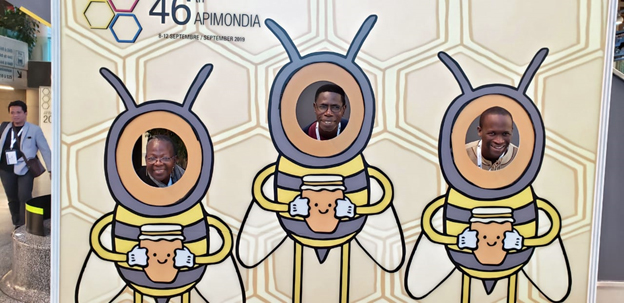Expert international assessments of the quality of honey being produced in Guyana and the potential of the product for holding its own as an important money earner in the agro-processing sector more than justifies “far greater official attention and support from government,” Vice President of the Guyana Apiculture Society (GAS) Linden Stewart has told the Stabroek Business.
During an interview with this newspaper earlier this week, Stewart said that his conviction that stronger official support for the local honey sector could see it make a significant international footprint derived from GAS’ participation in the September 8th – 12th 46th Apimondia International Apicultural Congress in Montreal, Canada.
Stewart, along with GAS’ Treasurer Aubrey Roberts and Janice Fraser, a longstanding member of GAS, were Guyana’s representatives at the Congress.
With more than 15,000 beekeepers from across the world having attended the Congress, Stewart told Stabroek Business that having overlooked an important rule regarding the submission of honey one month in advance of the event, Guyana had missed an important opportunity to become officially recognized as having one of the best products in the world. He explained that the irony of the situation is that having unofficially undergone tests during the forum, Guyana’s honey was actually accorded a clean bill of health even though it could not receive the official recognition.
Stewart told Stabroek Business that participation in the 46th Apimondia afforded GAS the opportunity to be updated on the status of the world’s honey resources, particularly threats to global honey quality. He said that on the basis on the outcomes of the World Honey Show, product from fifteen countries was rejected based on the amount of chemicals and pesticides present. The local beekeeper told Stabroek News that the fact that Guyana’s honey continues to receive a clean bill of health at the international level is all the more reason why it should attract a greater level of national attention.
In a frank exchange with the Stabroek Business, Stewart said that official interest in the beekeeping industry was manifested largely in a Unit within the Guyana Livestock Development Authority (GLDA) which he said was presently underequipped for what he sees as the important task of consolidating an important sector. “Apart from the fact that the Beekeeping Unit is under-resourced I believe that there ought to be more interaction between the GLDA and GAS. We are the people with the field experience and I don’t think that we get listened to enough,” Stewart told Stabroek Business.
The three local beekeepers who participated in the 46th Apimondia were all self-sponsored save and except contributions from a few private well-wishers. This, Stewart said, after efforts to secure official sponsorship bore no fruit.
Stewart said, however, that it was not a question of a complete lack of collaboration between GAS and the authorities. “We are still very much interested in working with the authorities.” He pointed out that as far as ‘getting things done is concerned” government still possessed far greater reach than GAS, pointing out that Beekeepers’ field knowledge coupled with official resources had to work to together to take the sector forward.
Asked about the current impasse with Trinidad and Tobago over the official restriction placed by Trinidad and Tobago on the passage of honey from Guyana through its territorial waters en route to other regional markets, Stewart said that while the official version proffered for the restriction had to do with fear of contaminated honey, presumably from Guyana and elsewhere, Trinidadians are known to be buying honey directly from Guyana and importing it into the Twin-Island Republic apparently with no hassle from the airport authorities there. He said that there is a likelihood that some of the contaminants that may be found in honey produced in Trinidad and Tobago are not present in honey produced in Guyana.
Asked about lessons learnt from the exposure of GAS officials to the Montreal Forum, Stewart said that what manifested itself at the forum were opportunities for collaboration with other countries at the highest levels to advance our local honey industry. “Whenever we attend these fora we discover that there is a high level of respect for the quality of our honey. The challenge is to keep up with the technology so that we can expand the industry, keep it free from infection and make it more profitable,” Stewart says.
And the local beekeeper told Stabroek Business that during the team’s stay in Canada the opportunity was used to make contact with a number of beekeepers from other countries who are interested in working with the sector locally. Asserting that the quality of Guyana’s honey and its global prospects are well-known internationally, he named the United States, Madagascar, Russia, Nigeria and Ethiopia as countries that appear keen to establish stronger honey-related ties with Guyana.

